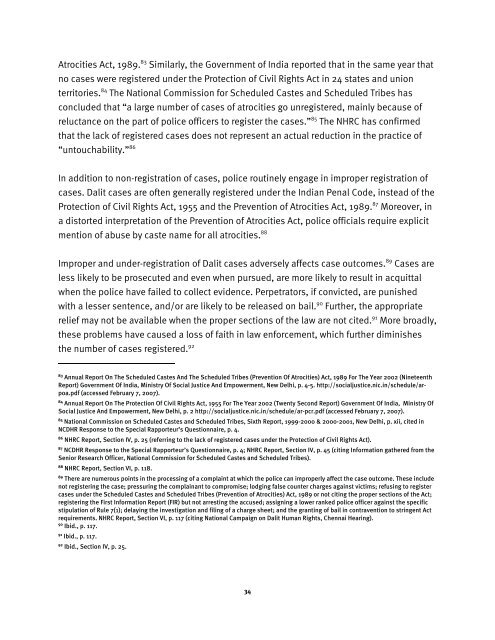Caste Discrimination against India's âUntouchablesâ - Human Rights ...
Caste Discrimination against India's âUntouchablesâ - Human Rights ...
Caste Discrimination against India's âUntouchablesâ - Human Rights ...
Create successful ePaper yourself
Turn your PDF publications into a flip-book with our unique Google optimized e-Paper software.
Atrocities Act, 1989. 83 Similarly, the Government of India reported that in the same year that<br />
no cases were registered under the Protection of Civil <strong>Rights</strong> Act in 24 states and union<br />
territories. 84 The National Commission for Scheduled <strong>Caste</strong>s and Scheduled Tribes has<br />
concluded that “a large number of cases of atrocities go unregistered, mainly because of<br />
reluctance on the part of police officers to register the cases.” 85 The NHRC has confirmed<br />
that the lack of registered cases does not represent an actual reduction in the practice of<br />
“untouchability.” 86<br />
In addition to non-registration of cases, police routinely engage in improper registration of<br />
cases. Dalit cases are often generally registered under the Indian Penal Code, instead of the<br />
Protection of Civil <strong>Rights</strong> Act, 1955 and the Prevention of Atrocities Act, 1989. 87 Moreover, in<br />
a distorted interpretation of the Prevention of Atrocities Act, police officials require explicit<br />
mention of abuse by caste name for all atrocities. 88<br />
Improper and under-registration of Dalit cases adversely affects case outcomes. 89 Cases are<br />
less likely to be prosecuted and even when pursued, are more likely to result in acquittal<br />
when the police have failed to collect evidence. Perpetrators, if convicted, are punished<br />
with a lesser sentence, and/or are likely to be released on bail. 90 Further, the appropriate<br />
relief may not be available when the proper sections of the law are not cited. 91 More broadly,<br />
these problems have caused a loss of faith in law enforcement, which further diminishes<br />
the number of cases registered. 92<br />
83<br />
Annual Report On The Scheduled <strong>Caste</strong>s And The Scheduled Tribes (Prevention Of Atrocities) Act, 1989 For The Year 2002 (Nineteenth<br />
Report) Government Of India, Ministry Of Social Justice And Empowerment, New Delhi, p. 4-5. http://socialjustice.nic.in/schedule/arpoa.pdf<br />
(accessed February 7, 2007).<br />
84<br />
Annual Report On The Protection Of Civil <strong>Rights</strong> Act, 1955 For The Year 2002 (Twenty Second Report) Government Of India, Ministry Of<br />
Social Justice And Empowerment, New Delhi, p. 2 http://socialjustice.nic.in/schedule/ar-pcr.pdf (accessed February 7, 2007).<br />
85<br />
National Commission on Scheduled <strong>Caste</strong>s and Scheduled Tribes, Sixth Report, 1999-2000 & 2000-2001, New Delhi, p. xii, cited in<br />
NCDHR Response to the Special Rapporteur’s Questionnaire, p. 4.<br />
86<br />
NHRC Report, Section IV, p. 25 (referring to the lack of registered cases under the Protection of Civil <strong>Rights</strong> Act).<br />
87<br />
NCDHR Response to the Special Rapporteur’s Questionnaire, p. 4; NHRC Report, Section IV, p. 45 (citing Information gathered from the<br />
Senior Research Officer, National Commission for Scheduled <strong>Caste</strong>s and Scheduled Tribes).<br />
88<br />
NHRC Report, Section VI, p. 118.<br />
89<br />
There are numerous points in the processing of a complaint at which the police can improperly affect the case outcome. These include<br />
not registering the case; pressuring the complainant to compromise; lodging false counter charges <strong>against</strong> victims; refusing to register<br />
cases under the Scheduled <strong>Caste</strong>s and Scheduled Tribes (Prevention of Atrocities) Act, 1989 or not citing the proper sections of the Act;<br />
registering the First Information Report (FIR) but not arresting the accused; assigning a lower ranked police officer <strong>against</strong> the specific<br />
stipulation of Rule 7(1); delaying the investigation and filing of a charge sheet; and the granting of bail in contravention to stringent Act<br />
requirements. NHRC Report, Section VI, p. 117 (citing National Campaign on Dalit <strong>Human</strong> <strong>Rights</strong>, Chennai Hearing).<br />
90<br />
Ibid., p. 117.<br />
91<br />
Ibid., p. 117.<br />
92<br />
Ibid., Section IV, p. 25.<br />
34

















